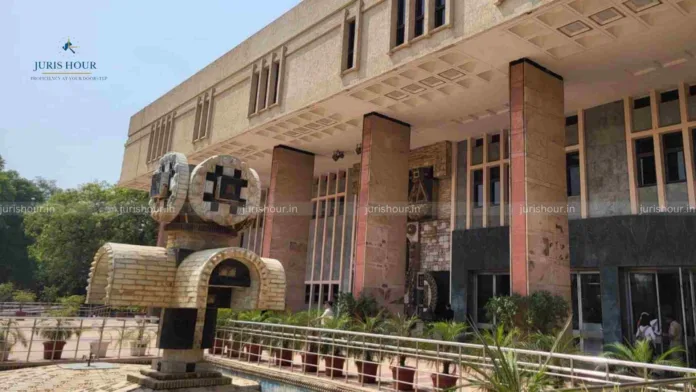The Delhi High Court has held that the high court cannot condone delay in filing of appeal beyond the timeline under section 107(1) and 107(4) CGST Act, 2017.
The bench of Justice Yashwant Varma and Justice Dharmesh Sharma has observed that the power to condone delay caused in pursuing a statutory remedy would always be dependent upon the statutory provision that governs. The right to seek condonation of delay and invoke the discretionary power inhering in an appellate authority would depend upon whether the statute creates a special and independent regime with respect to limitation or leaves an avenue open for the appellant to invoke the general provisions of the Limitation Act to seek condonation of delay.
The bench stated that the facility to seek condonation can be resorted provided the legislation does not construct an independent regime with respect to an appeal being preferred. Once it is found that the legislation incorporates a provision which creates a special period of limitation and proscribes the same being entertained after a terminal date, the general provisions of the Limitation Act would cease to apply.
The petitioner/assessee emanate from the orders handed down by the Appellate Authority, in which the Appellate Authority has negated the stand of the petitioners by dismissing their appeals on the ground of limitation as per Section 107 of the Central and Goods Services Tax Act, 2017. The petitioners also sought the quashing of the Show Cause Notices issued to them by the respondents and the restoration of their respective GST registrations.
The petitioners are registered proprietors/dealers under the CGST Act, each holding different registration numbers. They were assessed by the respective adjudicating authorities which resulted in certain demands being raised against them and in some instances, their GST registrations being cancelled.
Aggrieved by the cancellation of their GST registrations and the demands imposed, the petitioners filed statutory appeals before the Appellate Authority under Section 107 of the CGST. However, those appeals were not entertained and were dismissed due to delay in filing.
As the Central Government is yet to institute an Appellate Tribunal, the petitioners, aggrieved by the rejection of their appeals, have approached this Court by invoking its writ jurisdiction. For the sake of convenience and for proper adjudication, each of the writ petitions will be discussed individually.
A SCN was issued by the department proposing the cancellation of the petitioner firm’s GST registration on the ground of “non-commencement of business within six months from the date of registration,” in the case of voluntary registration. The petitioner firm submitted a reply to the notice on 03.10.2022, providing explanations for the alleged discrepancies and furnishing the necessary documentation to demonstrate compliance with the GST provisions. Despite this, respondent No. 2 proceeded to cancel the petitioner firm’s GST registration on 27.10.2022, with effect from the original date of registration, i.e., 07.06.2018.
The petitioner filed an appeal before the Appellate Authority under Section 107 of the CGST Act on 12.02.2024. However, by order dated 29.07.2024, the appeal was dismissed in limine, on the ground that the impugned order was of 27.10.2022 and the appeal was filed on 12.02.2024, which is beyond the prescribed time limit set forth in the provisions of sub-sections (1) and (4) of Section 107 of the CGST Act.
The petitioner contends that the delay in filing the appeal was due to the fact that they had submitted their reply to the SCN, which was duly received by respondent. Despite this, the cancellation order issued by respondent erroneously stated, “whereas no reply to notice to show cause has been submitted.”
The petitioner asserts that they made several visits to the respondent to rectify this clerical mistake, which caused the delay in filing the appeal.
Section 107 of the CGST Act, being a self-contained provision, prescribes a specific limitation period for filing appeals, reflecting the legislative intent to expedite dispute resolution and by setting strict time limits, the provision ensures that tax-related matters are adjudicated without unnecessary delays, thereby enhancing administrative efficiency and revenue certainty. It was held that Section 5 of the Limitation Act generally allows for extensions in exceptional cases but its application is expressly excluded in taxation statutes where specific timeframes are prescribed.
The court while emphasizing the significance of the statutory limitations in tax laws, particularly in the context of the CGST Act, it was also pointed out that limitation provisions are crucial in ensuring the timely resolution of disputes, promoting legal certainty, and facilitating efficient tax compliance. It was held that given the complexity of tax laws and the potential for disputes between taxpayers and authorities, such provisions establish a structured framework that prevents undue delays and ensures fiscal stability.
The court dismissed the appeal filed beyond the prescribed period of limitation provided by Sections 107 (1) and 107 (4) of the CGST Act.
Case Details
Case Title: M/S Addichem Speciality Llp Versus Special Commissioner I, Department Of Trade And Taxes And Anr
Case No.: W.P.(C) 14279/2024 and CM APPL. 59773/2024 (Interim Relief)
Date: 07 February 2025
Counsel For Petitioner: Rupak Srivastava
Counsel For Respondent: Udit Malik





